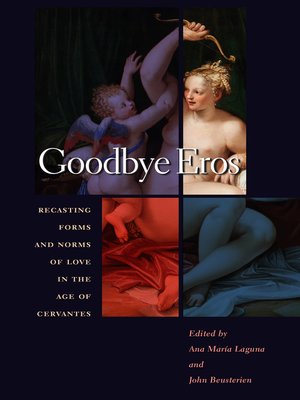Goodbye Eros
ebook ∣ Recasting Forms and Norms of Love in the Age of Cervantes · Toronto Iberic
By Ana Laguna

Sign up to save your library
With an OverDrive account, you can save your favorite libraries for at-a-glance information about availability. Find out more about OverDrive accounts.
Find this title in Libby, the library reading app by OverDrive.



Search for a digital library with this title
Title found at these libraries:
| Library Name | Distance |
|---|---|
| Loading... |
Traditional Petrarchan and Neoplatonic paradigms of love started to show clear signs of inadequacy and exhaustion in the sixteenth century. How did the Spanish Golden Age recast worn out discourses of love and make them compelling again? This volume explores how Spanish letters recognized that old love paradigms, especially the crisis of the subject, presented an extraordinary opportunity for revising traditional literary strictures. As a result, during Spain's nascent modernity, literature took up the challenge to expand existing forms of desire and subjectivity.
A range of scholars show how canonical and non-canonical Golden Age writers like Miguel de Cervantes, Diego Hurtado de Mendoza, Francisco de Quevedo, Luis de Góngora, Lope de Vega, and Francisco de la Torre y Sevil became equal agents of the sweeping ontological reconfiguration of the idea of eros that defined their culture. Such reconfiguration includes: the troubling displacement of "self" and "other" seen in sentimental genres like the pastoral or romance; the overlapping of emotions such as love and jealousy characteristic of the baroque lyric and dramatic production; and the conflation of axioms such as eros and eris prevalent in contemporaneous epic experiments.
In uniting the findings of often surprising texts, the collection of essays in Goodbye Eros takes a pioneering look at how Golden Age moral, ideological, scientific, and literary discourses intersected to create fascinating re-elaborations of the trope of love.







